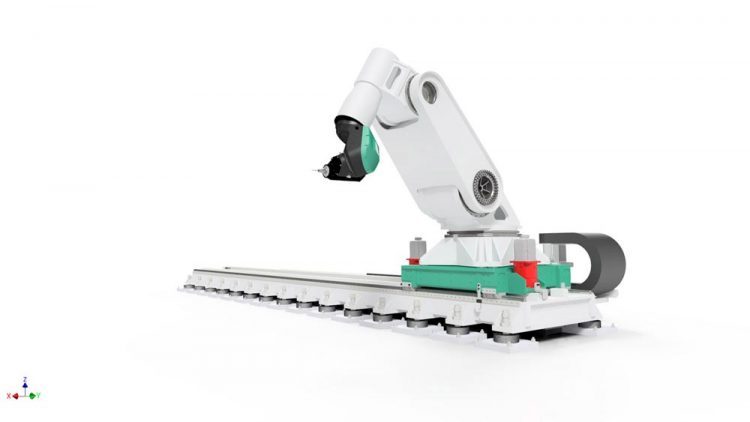New kinematics for milling – customized, high-precision manufacturing

Machining robot Flexmatik. (C) Fraunhofer IFAM
More and more consumers are demanding made-to-order, customized products. The production facilities of tomorrow will need to be efficient and versatile if they hope to meet increasingly stringent requirements and the specific needs of each customer – all while mastering the pressure of rising costs.
High-precision machine tools that impart a certain geometrical shape to workpieces remain the solution of choice. Conventional industrial robots have simply been unable, due to their insufficient precision, to supplant such machine tools.
Using robots for milling operations remains particularly challenging. Primarily due to the gear units, low robot stiffness deflects the tool – reducing its appeal for use. Indeed, production staff must comply with extremely tight production tolerances every time they machine lightweight materials, such as aluminum or carbon fiber reinforced plastic (CFRP), as well as metals, and steels.
Customized production, even for a batch size of one
Researchers working on Fraunhofer’s “Flexmatik 4.1“ joint research project (please see box) are developing an industrial robot designed for the high-precision milling of lightweight materials. The project partners are the Fraunhofer Institutes for Production Systems and Design Technology IPK, for Manufacturing Technology and Advanced Materials IFAM, and for Structural Durability and System Reliability LBF. The researchers must overhaul the kinematics if the robot is to prove successful.
Sascha Reinkober, department head at Fraunhofer IPK, explains: “We’re engineering a multi-axis kinematic chain that is specially designed for continuous path processes.” The robot proceeds from point A to point B of the component being machined by traversing a linear unit, a type of rail. “The system simulations we conducted during the design phase indicate that we can achieve a precision objective of plus/minus 0.1 millimeters.
This will be possible starting from the very first component, despite the process forces acting on it. Manufacturers can therefore customize production, even for a batch size of just one unit,” says Jan Hansmann, project leader at Fraunhofer LBF. “Under the exposure of process forces, the robot will stray far less from its programmed target path. The robot can consequently drill a hole at the intended spot of the component with far greater precision, for instance.”
To ensure high precision, the team of researchers is developing a new drive concept for individual axes. Partially direct drives are used, which are considerably stiffer during operation than today’s high-tech gear units. And a new climate-control strategy minimizes imprecision due to temperature fluctuations. The robot is also equipped with a cnc control for machine tools. Last but not least, the new Flexmatik features an active vibration control system.
The new designed robot offers key benefits compared to machine tools: the cost of acquisition decreases by as much as a factor of 10 and the energy consumption by as much as a factor of 15. Thanks to its linear unit, the Flexmatik exhibits a workspace on par with large portal milling machines – and better accessibility. Compared to a portal milling machine, the Flexmatik does not require a special heavy foundation. This keeps construction costs lower and grants users flexibility in setting it up. Fraunhofer researchers want to complete a functional prototype by the end of 2018.
Their innovative milling robot can handle a broad range of applications – including the machining of large CFRP structures such as fuselages, the milling of components for gas turbines, and the re-contouring of press tools. “The Flexmatik is a suitable choice for many applications in practically all sectors which use machine tools. But it’s not about replacing machine tools. The Flexmatik can instead be a useful addition that shares workloads. The ultimate goal is to make production processes more cost-effective,” emphasizes Sven Philipp von Stürmer, project leader at Fraunhofer IFAM.
https://www.fraunhofer.de/en/press/research-news/2018/July/new-kinematics-for-mi…
Media Contact
All latest news from the category: Machine Engineering
Machine engineering is one of Germany’s key industries. The importance of this segment has led to the creation of new university degree programs in fields such as production and logistics, process engineering, vehicle/automotive engineering, production engineering and aerospace engineering among others.
innovations-report offers informative reports and articles covering technologies such as automation, motion, power train, energy, conveyor, plastics, lightweight construction, logistics/warehousing, measurement systems, machine tools and control engineering.
Newest articles

Self-Destructing Cancer Cells: Cutting-Edge RNA Breakthrough
Jülich scientists use novel RNA technology to selectively switch off tumours in the brain. An Adaptable Platform Technology That Destroys Glioblastoma Cancer Cells Using a special RNA molecule, a team…

Endurance Training: Transforming Lives of Heart Failure Patients
Can strength and endurance training be beneficial for patients with a certain form of heart failure? A research team from Greifswald investigated this question together with seven other research centers…

A Wake-Up Call for Mediterranean Shark Protection Against Extinction
Overfishing, illegal fishing and increasing marketing of shark meat pose significant threats to the more than 80 species of sharks and rays that inhabit the Mediterranean Sea, according to a…



